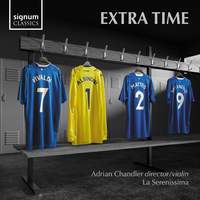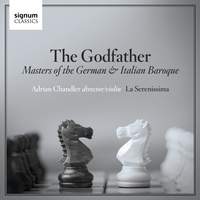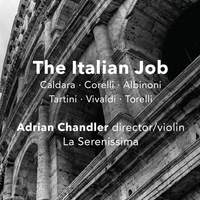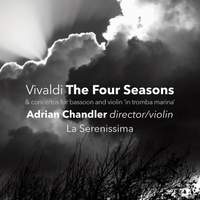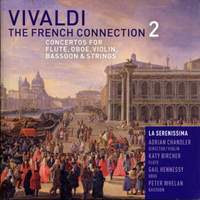Interview,
Adrian Chandler on Extra Time (transcript)
 Adrian Chandler and his ensemble La Serenissima are well known for their explorations of intriguing corners of the Baroque repertoire. Their sparkling recordings bring composers to light who might otherwise rarely be heard, often presenting them under a slightly offbeat title. In the wake of The Italian Job and The Godfather, their latest album's title of Extra Time encapsulates the spirit with which Chandler and his musicians approach this music. Having started life as a handful of pieces that couldn't fit into one of their earlier recordings, the list of "ones that got away" grew until it constituted a complete album in its own right, with the title playing into this origin.
Adrian Chandler and his ensemble La Serenissima are well known for their explorations of intriguing corners of the Baroque repertoire. Their sparkling recordings bring composers to light who might otherwise rarely be heard, often presenting them under a slightly offbeat title. In the wake of The Italian Job and The Godfather, their latest album's title of Extra Time encapsulates the spirit with which Chandler and his musicians approach this music. Having started life as a handful of pieces that couldn't fit into one of their earlier recordings, the list of "ones that got away" grew until it constituted a complete album in its own right, with the title playing into this origin.
Adrian Chandler was kind enough to share some of his thoughts about this album, and the various pieces that make it up.
The simple concept behind this album – 'we couldn’t fit everything that we wanted into our last albums, so we just made another one' – seems so obvious, and rooted in a pure enthusiasm for the music, yet it’s rare for this to be acknowledged as openly as you have here. Why do you think people don’t embrace this approach more often?
Well, I think it’s understandable that people feel they have a sort of concept before they go into the recording studio – I always try and have a theme for La Serenissima recordings, and some people go in and record an entire opus or collection by a composer. But this disc was a little bit different, because none of it was really planned – it’s just brilliant music, so why not? I’m sure we’ll do it again!
Would it have been usual for the Nicola Matteis ballet-derived pieces on this album to have been performed by themselves as standalone 'concert' items in the Baroque era, or would they only have existed within the context of their respective parent works?
The thing with Italian ballet music of this era is that most of it doesn’t survive. Take Vivaldi: if you look at records that survive for Vivaldi operas, very often you can find exactly who sang and who did the stage design (for instance, one of Canaletto’s early jobs was working with his dad on stage-design for Vivaldi operas), and often you can find choreographers as well. It’s interesting, therefore, that hardly any ballet music for Vivaldi operas survives: it was so common that the ballet music was written by a different composer and would just be chucked in the bin at the end of the show! So would they have been played? Probably not, I don’t think. The Matteis items are slightly different, because they were written for the homegrown emperor Charles VI who was a massive musicophile – he particularly loved loud trumpet stuff (hence the four trumpets that feature in both the ballets on this disc). The Emperor might have requested if he could have a certain ballet played for him in private, but we don’t know for sure, and I suspect we never will!
We often tend to think of the England of this time as more an importer of musical styles than an exporter – yet you allude to Purcell having had an influence on Matteis’s writing. Is there any evidence that elements of the English Baroque style actually took root on the Continent more generally?
Well yes, there is. First of all it’s important to say that Purcell had a massive influence on Matteis’s writing because Matteis – half-English, half-Italian – grew up in Purcell’s London, and certainly his father knew Purcell. When Telemann is talking about the ‘mixed taste’, the melting-pot of European styles, one of the styles he talks about is ‘the English style’, so we know Telemann was aware of it. Brescianello is another of the composers that features on this disc: I’ve just finished editing all six of his orchestral suites, and I think it’s the C major suite that has a hornpipe in it. I’ve never seen an Italian composer writing a hornpipe before, and if that’s not English I don’t know what is! So yes, I think the English style had more of an influence on the continent than we perhaps give them credit for. Also Vivaldi, when he was writing for the viol, called the viol a ‘viola inglese’ – an ‘English viola’. Possibly this is because Vivaldi was aware that the English had written huge amounts of very fine (but by Vivaldi’s standards quite outdated) viol music, so maybe he was alluding to that there as well.
One of the unexpected delights of The Godfather was the Brescianello double concerto for bassoon and violin, and this relatively obscure composer makes a return appearance here with a violin concerto. How did you first come across Brescianello’s music, and what do you think makes it so special?
I can’t really remember how I came across it – I often come across composers by accident while rooting about for something else! - but he’s just brilliant. It’s very Vivaldian, yet he has a sort of German approach to harmony that Vivaldi doesn’t have – which is unsurprising given that in the early 1710s he’d been in the employ of the Electress of Bavaria, who was exiled in Venice at that point. After the peace treaty at the end of the Spanish Wars of Succession was signed, Brescianello went back to Munich with the Electress and then shortly afterwards left Munich to go and take up the reins of Kapellmeister at the court of Würzburg in Germany, near Stuttgart. So it’s unsurprising that there are German elements, but it’s very joyful music – it’s full of energy, like you find in Vivaldi, and the slow movements are exquisite.
It seems common for Italian concerti and orchestral works from this period to have subtitles – as three of the works featured on this album do, linking them to operas, feast-days or famous dedicatees. Why do you think composers tended to place the 'topic' of a piece so prominently during this period?
I don’t think that they really did! I think Vivaldi is relatively unusual in this respect – Locatelli for instance, occasionally did it, and certainly it’s true that in the seventeenth century there was a massive vogue for giving your sonatas titles, but it was certainly not as common by Vivaldi’s day. The C major concerto by Vivaldi for instance, is dedicated to the Holy Roman Emperor – if I was writing a concerto for the Holy Roman Emperor I think I’d probably state that in the title as well! It’s a feather in Vivaldi’s cap, so why not? In terms of something like the Concerto for the Feast of St Laurence, Vivaldi seems to have left us a handful of concertos that were written for religious feast days, and again why not? It may also have been that it was a prestigious event where this concerto was being performed for the first time, so maybe it’s Vivaldi just saying ‘Hey guys, this is what I’ve been doing - I’ve been writing for the Holy Roman Emperor, I’ve been writing for this church here, and having my works performed all over the place!’
As any football fan will know – perhaps particularly those who follow England – Extra Time need not be the end of the match; there is always the prospect of the dreaded penalty shootout. Despite the resplendent finale of this album, do you think there might be scope for a further album of 'ones that still got away', or has this avenue of exploration definitely come to a conclusion for now?
Give us a few years and there’ll be a penalty shoot-out disc on the way! Because I’m quite a pragmatic chap, if we finish a bunch of recording-sessions with half an hour left over then we’ve paid the musicians for that half-hour, so why not see if you can get some stuff down? Funnily enough, back in February, when we still could play together, we made a disc that’ll be coming out next Feb called Settocento: it’s a chamber album, and we put down a trio sonata by Caldara at the end of those sessions. I haven’t heard it yet, so don’t know if it’s useable…! We actually recorded the Vivaldi Concerto for the Feast of St Laurence on this album in 27 minutes – I’d never be able to do that in a normal recording session, but if you think ‘Let’s just see how it goes’ you kind of throw caution to the wind. Everybody’s thinking ‘We’ve done what we came to do, now let’s have a bit of fun and play some really great music!’. Anyway, buy the album and see for yourselves!
La Serenissima, Adrian Chandler
Available Formats: CD, MP3, FLAC, Hi-Res FLAC
Related recordings
La Serenissima, Adrian Chandler
Available Formats: CD, MP3, FLAC, Hi-Res FLAC
Adrian Chandler (director/violin), Gail Hennessy, Rachel Chaplin (oboes) & Peter Whelan (bassoon), La Serenissima
Available Formats: CD, MP3, FLAC, Hi-Res FLAC
Adrian Chandler (director/violin), Peter Wheelan (bassoon), La Serenissima
Available Formats: CD, MP3, FLAC
Adrian Chandler (director/violin), Katy Bircher (flute), Gail Hennessy (oboe) & Peter Whelen (bassoon), La Serenissima
Available Formats: CD, MP3, FLAC


